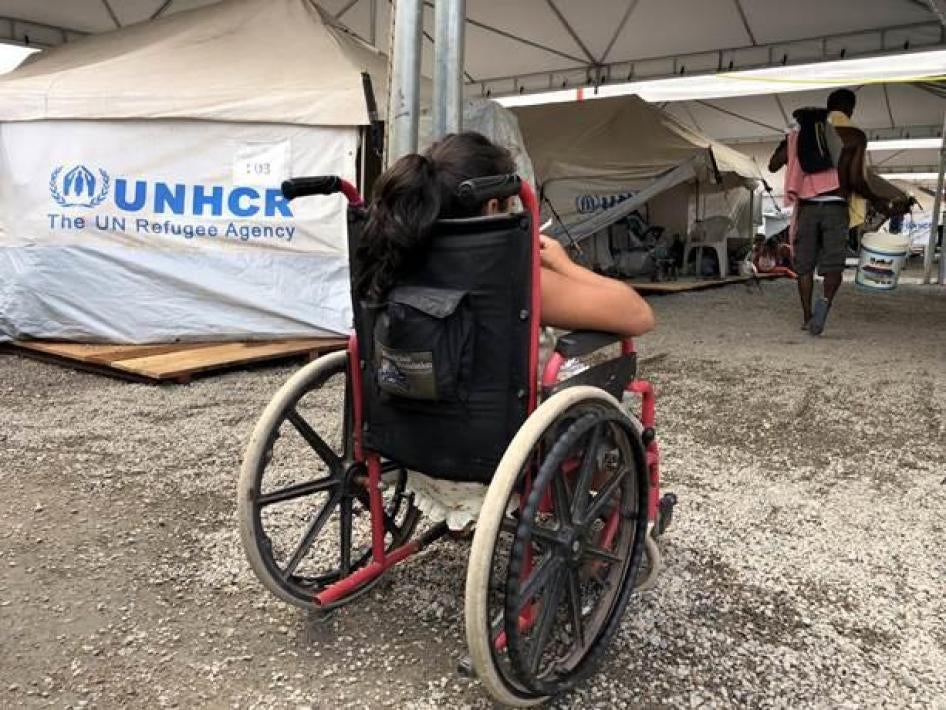“Gabriela” is a 10-year-old Venezuelan girl paralyzed from the waist down who uses a wheelchair. Two years ago, she had to stop going to the hospital because her family could not afford the trip.
At that point, the hospital also could not provide catheters for her. Her family was reusing for months urinary catheters that should have been used once and thrown away, rinsing them instead with vinegar each time. This led to kidney damage requiring daily medications.
When the parents could no longer obtain the medicines she needed, Gabriela began having fevers, and swollen feet, leaving her parents with no choice but to flee Venezuela in search of affordable medical care.
In this horrifying context, it is deeply troubling that the recently elected governor of Roraima, Antonio Denarium, has proposed closing the border and establishing a program to “return” Venezuelans who are already here.
Gabriela’s family came to Brazil with their five children, walking part of the 215kilometer route from Pacaraima to Boa Vista, the capital of Roraima, with at least one of their other children sitting in Gabriela’s lap in the wheelchair. Generous Brazilians picked them up in cars and drove them part of the way.
When they arrived in Boa Vista, they lived on the streets along with many other Venezuelans and ate food they found in the garbage.
Gabriela’s family are among three million Venezuelans who have fled the country due to the lack of medicines and food, political repression, hyperinflation, and insecurity. Her desperate story highlights how the health system has collapsed in Venezuela. Gabriela needed specialized care, but even basic health services, like vaccines and treatment for infectious diseases, are unavailable.
What little data are available reveal that outbreaks of measles and diphtheria are rising, and the number of cases of malaria and tuberculosis are at their highest levels in 30 years. Eighty seven percent of people living with HIV and registered to receive anti-retroviral treatment from the Venezuelan public health system are not getting it. Surging malnutrition compounds the health crisis. Gabriela was lucky that her parents made the difficult trip to Brazil, where she is finally getting the care she needs, but what is happening to people who are too sick to travel?
The human rights and humanitarian crisis in Venezuela happen after years of dismantling democratic institutions, including judicial independence, which goes back to the presidency of Hugo Chávez, Maduro’s predecessor. Since taking office in 2013, Maduro only intensified the already strong concentration of power and has used it to commit all sorts of unchecked abuses.
President-elect Jair Bolsonaro was right when he said that Venezuelans can’t be treated as “goods” that can be simply “returned” back home. He has proposed creating “refugee camps” for Venezuelans on Brazilian soil but has provided no further details. In any case, the best response would be not to isolate Venezuelan refugees, but to strengthen programs to integrate them into Brazilian society, including moving those who so desire to other regions of the country. All programs should include people with disabilities and ensure their life in the community and access to food, medical care and other services on an equal basis with others.
Brazil has, despite many challenges, made considerable efforts to welcome Venezuelans, not only with shelter, food and medical care, but also adopting rules to provide them legal permits to stay and making it possible for them to apply for asylum.
Bolsonaro should maintain those policies, while he works with other countries and UN agencies to design a regional response plan. The international community should also redouble the pressure on Venezuela to recognize the gravity of the crisis and accept whatever international aid is needed so that children like Gabriela do not face the choice of either leaving the country or dying.










